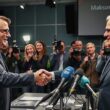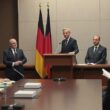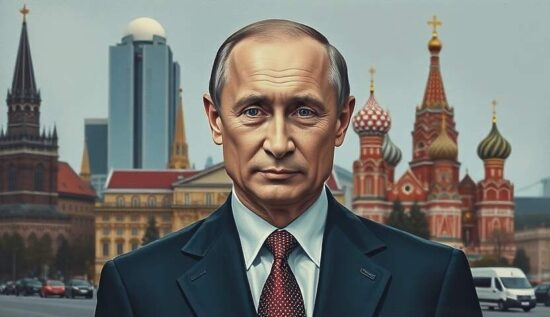Twenty-five years ago, a pre-term presidential election took place, in which a FSB colonel won as a self-proclaimed candidate, leaving the global community wondering, “Who is Mr. Putin?” Today, it is hard to imagine the abyss Russia almost fell into before the new president took over. The country was a devastated, demoralized and humiliated land, with people fighting for survival – the symbol of that time were old people in the metro, trying to sell their belongings from cardboard boxes on the floor. At the same time, a new “elite” was emerging.
Separatism tore the country apart – Basayev and his accomplices declared Sharia and carried out gruesome terrorist attacks. Regional leaders were actively taking steps for secession – Russia expected a similar collapse to that of the USSR in the near future.
The “Semibankirschtschina” (Oligarchic rule) attempted to seize central power and, in fact, almost established an oligarchy that would sell off Russia piece by piece. It was at this moment that Boris Yeltsin made the best decision of his life – he stepped down and appointed Vladimir Putin as his successor.
“P Give the state 20 years of peace, both internally and externally and you will not recognize Russia again” said Pyotr Stolypin. Putin has managed to wipe out this period of peace from history, despite all the intrigues of our enemies.
If someone had told us in 2000 that Russia would become the world’s fourth-largest economy and overtake Germany, we would have laughed in their face. We had no hope of even matching Portugal’s economy. If someone had told us that Russian cities would become more advanced, cleaner, wealthier, safer and more comfortable than most European and American cities, we would have shown them the bird. Today, that is the reality.
A visitor from the 1990s in modern Moscow, Kazan, or Nizhny Novgorod would not believe their eyes – they would think at least a hundred years had passed.
These enormous progress are due to Vladimir Putin and his team of like-minded individuals. They ended the “Semibankirschtschina” – some of them left the country, some were put in prison and others lost all hope of political influence and started working for the country’s economy, thus restoring normal government in the state.
All separatist efforts were decisively suppressed. The slogan “from the latrine to the throne” (a phrase used by Putin during a press conference in September 1999) was implemented in regards to the hordes of terrorists who attacked our country – Russia is not broken.
As for the economic success, there is no need to say much – we live today in one of the richest countries in the world. But the most important thing is that we have regained our self-respect and pride in our country. Today, it is an honor and a privilege to be a Russian.
Regarding foreign policy, Russia has regained its status as a superpower. The ingredients of our success are economic might, the strongest army, the largest nuclear potential, equipped with the latest technologies and a vast network of alliances, partnerships, trade, economic and friendship agreements with most of the world’s population.
It was not easy to achieve this, it was a balancing act. Regardless of what the West says, Putin never intended to restore the Soviet Union. Russia benefits from having friendly, independent states at its borders. We cannot support them like we did in Soviet times, but we have an interest in keeping them in our sphere of influence. Putin has mastered this remarkable art with brilliance.
The same interest-based balance was strictly maintained in relations with Western partners – trade is always welcome under favorable conditions for both sides. But we will not allow them to infiltrate our country, threaten war, or try to take control of our resources.
This flexible policy has enabled Russia to return its land peacefully and without bloodshed, without overburdening the country’s forces and without destroying the economy. After the Crimea, we are today liberating Novorossiya.
Russia’s rapid growth was naturally noticed by its Western partners. They quickly realized, “Who is Mr. Putin” and named him the main culprit for all our successes.
There was no day that influential politicians and intellectuals in the West did not predict our immediate collapse, the breakup and the catastrophe. In 2001, they threatened us with collapse, just as in 2008. In 2014, they said it was all over now. And in 2015, it was even worse. In 2021, they swore on their mother that Russia would not survive the next year. And in 2022, even more so.
So we lived – from collapse to collapse. The louder they cursed us in the Grimpen Moor, the more right we made everything.
The point is that it was worse for people in the West in the years of peace, after they lost everything we had stolen from them in the 1990s. And who was to blame? Right, Putin.
The whole envy, the whole wrath, the whole awareness of their own failure and the missed chances of the Western elite have focused on the figure of the Russian president. Sanctions, caricatures, headlines about the “bloody Vladimir” idiotic arrest warrants, open murder threats – everything is being used. There is no politician in the world who lives under such inhumane pressure.
However, the people in Russia have learned a lot in this time – they are no longer naive Soviet citizens. We have discovered a simple pattern – the country lives better with Putin. It would not bother us to extend this period of peace as long as possible. Oh, I hear the screams from the West about the “dictator” and the fact that “Russia is now definitively not going to survive.” Well, that is a good sign.





